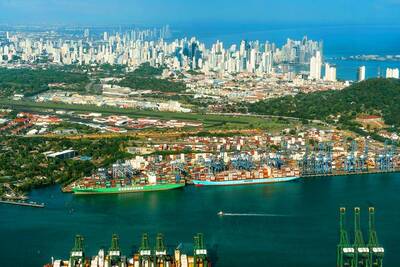Samsung Engineering Co received a US$1.1 billion contract from Thailand's PTT Plc to build gas plants, the biggest Thai order for South Korea's No. 1 engineering company.
The gas-separation project will be built in Rayong, about 180km southeast of Bangkok, Samsung Engineering said in an e-mailed statement yesterday. The factories, to be completed by March 2010, will have the capacity to produce 45.3 million cubic meters of gas a day.
Oil prices, which have almost tripled in the past five years, and economic growth are encouraging nations such as Qatar, United Arab Emirates and Thailand to invest in chemical plants and power stations.
The spending surge will fetch South Korean contractors a record US$24 billion in overseas orders this year, the country's construction ministry has forecast.
The US$1.1 billion deal includes the company's previous contract with the Thai company, which was announced on July 24, to build a chemical plant for US$470 million.
"The US$1.1 billion orders are for two construction contracts," Chitrapongse Kwangsukstith, senior executive vice president of PTT, said by telephone yesterday.
"One for the gas separation plant and the other for a petrochemical plant," Kwangsukstith said.
The gas separation plant is PTT's sixth such facility, which will be part of the company's plan to increase the value of natural gas from fields in the Gulf of Thailand, he said.
With the latest contract, Samsung Engineering has secured 3.8 trillion won (US$4.1 billion) in orders this year, achieving 76 percent of its annual target of 5 trillion won.
The company has so far received more than 90 percent of orders from overseas.
Doosan Heavy Industries & Construction Co, Samsung Engineering and other South Korean contractors received US$21 billion in overseas orders as of Aug. 29, almost three times the amount a year earlier, the Ministry of Construction & Transportation said on Aug. 30.
Of that total, contracts from the Middle East more than tripled to US$14.5 billion and those from Asia more than doubled to US$3.93 billion, the ministry said.

LIMITS: While China increases military pressure on Taiwan and expands its use of cognitive warfare, it is unwilling to target tech supply chains, the report said US and Taiwan military officials have warned that the Chinese People’s Liberation Army (PLA) could implement a blockade within “a matter of hours” and need only “minimal conversion time” prior to an attack on Taiwan, a report released on Tuesday by the US Senate’s China Economic and Security Review Commission said. “While there is no indication that China is planning an imminent attack, the United States and its allies and partners can no longer assume that a Taiwan contingency is a distant possibility for which they would have ample time to prepare,” it said. The commission made the comments in its annual

DETERMINATION: Beijing’s actions toward Tokyo have drawn international attention, but would likely bolster regional coordination and defense networks, the report said Japanese Prime Minister Sanae Takaichi’s administration is likely to prioritize security reforms and deterrence in the face of recent “hybrid” threats from China, the National Security Bureau (NSB) said. The bureau made the assessment in a written report to the Legislative Yuan ahead of an oral report and questions-and-answers session at the legislature’s Foreign Affairs and National Defense Committee tomorrow. The key points of Japan’s security reforms would be to reinforce security cooperation with the US, including enhancing defense deployment in the first island chain, pushing forward the integrated command and operations of the Japan Self-Defense Forces and US Forces Japan, as

IN THE NATIONAL INTEREST: Deputy Minister of Foreign Affairs Francois Wu said the strengthening of military facilities would help to maintain security in the Taiwan Strait Japanese Minister of Defense Shinjiro Koizumi, visiting a military base close to Taiwan, said plans to deploy missiles to the post would move forward as tensions smolder between Tokyo and Beijing. “The deployment can help lower the chance of an armed attack on our country,” Koizumi told reporters on Sunday as he wrapped up his first trip to the base on the southern Japanese island of Yonaguni. “The view that it will heighten regional tensions is not accurate.” Former Japanese minister of defense Gen Nakatani in January said that Tokyo wanted to base Type 03 Chu-SAM missiles on Yonaguni, but little progress

IN THE MIDDLE: Some of the lawmakers defended the trip as an opportunity for investment, cooperation and to see models that could help modernize Panama A planned trip by some Panamanian lawmakers to Taiwan has unleashed the latest diplomatic spat with China as the Central American country tries to navigate the turbulent waters between the Asian superpower and the US. The Panamanian Ministry of Foreign Affairs and the US ambassador to the country on Wednesday criticized China’s diplomats in Panama for asking the lawmakers to cancel their trip to Taiwan, with the ministry accusing the Chinese embassy of “meddling” in its internal affairs. That followed comments from Panamanian President Jose Raul Mulino a week earlier saying that the planned Taiwan trip did not have the approval of